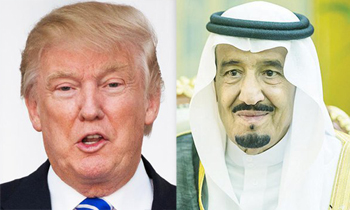Riyadh, Jan 30: King Salman on Sunday received a phone call from US President Donald Trump, during which the two leaders discussed international and regional developments as well as means to boost economic, security and military ties.
 Among the issues discussed were the efforts to combat terrorism and extremism and means to finance those efforts, a Saudi Press Agency statement said.
Among the issues discussed were the efforts to combat terrorism and extremism and means to finance those efforts, a Saudi Press Agency statement said.
The two leaders have identical views on the need for an adequate mechanism to combat those two challenges to the world security.
They also reaffirmed strong ties between the US and Saudi Arabia and the need for joint efforts to address attempts by others to destabilize regional security and intervene in countries’ internal affairs.
King Salman extended an invitation to Trump to visit Saudi Arabia as both sides agreed to exchange visits to boost joint cooperation and stimulate strategic partnerships between the two countries.
President Trump also had a phone call with Sheikh Mohammed bin Zayed Al-Nahyan, Crown Prince of Abu Dhabi and Deputy Supreme Commander of the UAE Armed Forces, on Sunday during which they explored ways of enhancing bilateral ties, UAE state news agency WAM reported.
Sheikh Mohammed affirmed that extremism and terrorism have no religion or identity and the groups that preach false slogans and ideologies seek to disguise their criminal intention in spreading chaos and destruction.
The two sides took stock of the latest regional issues and developments in light of the UAE and US’ vision regarding important ideas and initiatives that aim to put an end to the security and humanitarian deterioration in the region.
The also emphasized their commitment to realize stability and security in the region and support joint efforts to counter extremism, violence and terrorist groups that threaten security and safety of countries and peoples.
“The UAE is looking forward to overcome this stage of chaos and instability in the region through joint co-operation and efforts that serve mutual interests, achieve peace and stability and restore security,” Sheikh Mohammed said.





Comments
Add new comment